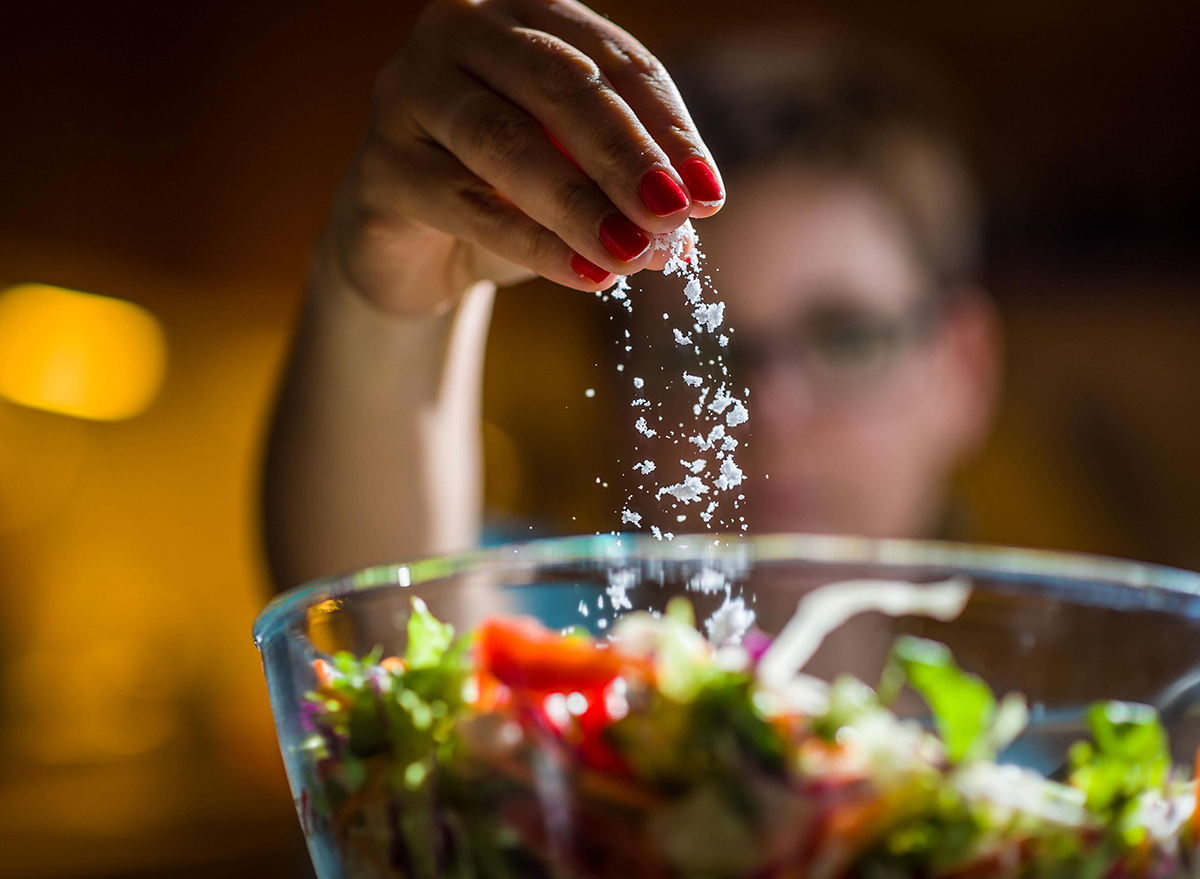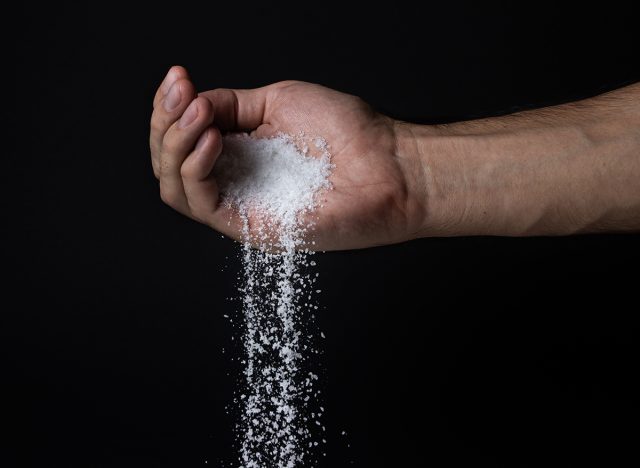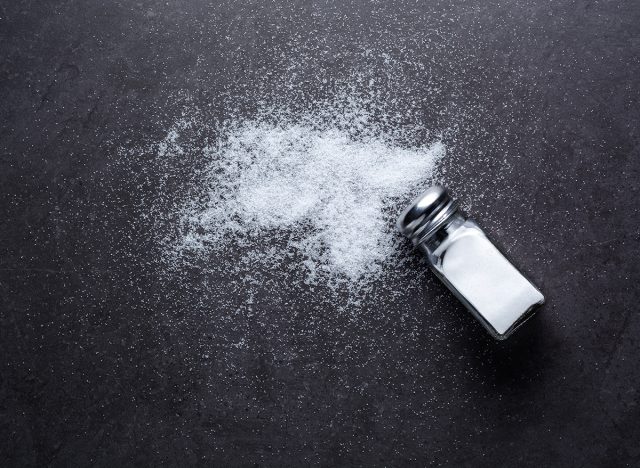Here’s What Happens to Your Body When You Eat Too Much Salt

Salt helps bring out the flavor of food, it enhances texture, and it serves as a preservative. Table salt is 60% chloride and 40% sodium by weight. Sodium is one of the core essential electrolytes that your body needs in small amounts to do everything from digest food to contract a muscle or blink your eye. Problem is, today’s sodium intake far exceeds what the body needs to be at its best.
There are more than 25 sodium-containing ingredients that food manufacturers commonly use in their formulations to make irresistible products that have long shelf lives. Common sodium-containing ingredients may be listed as salt, sodium bicarbonate, sodium nitrate, and more than 20 other names that mean added sodium. Most ultra-processed foods contain high sodium counts, and even foods that don’t taste salty, like bread, cereal, and dairy products, may have surprisingly high sodium counts. But what happens to your body if you eat too much salt?
Salt and sodium: how much is too much?

Our bodies need only a small amount of sodium each day, 500 milligrams or the equivalent of ¼ teaspoon of salt, to help contract muscles, maintain healthy nerve impulses, and maintain fluid balance. Most Americans eat about 3,400 milligrams of sodium each day, while the recommended maximum is up to 2,300 milligrams (the amount present in 1 teaspoon of salt) per day. However, 1,500 milligrams per day is an ideal limit, per the American Heart Association.
For many people, acute and chronic intake of excess sodium can have negative health effects, including leading to high blood pressure, increased risk for stroke, and coronary artery disease.
We reviewed the research, and here’s exactly what happens when you eat too much salt in the near term and over time when you consistently over consume.
Here’s what happens if you eat too much salt

It can harm your blood vessels and heart
The most common health issues associated with chronic high-sodium intake is high blood pressure or hypertension. Once consumed and when it enters the bloodstream, sodium is a sponge for water. When more water is drawn into the blood, the fluid volume increases and the pressure against your blood vessel walls rises. Hypertension is considered the silent killer, because it has very few signs or symptoms that people can see or feel, so they often ignore the advice of their medical provider to address their elevated pressure.
Hypertension is the number one risk factor for developing cardiovascular disease, according to research published in the journal Hypertension. It is estimated that high blood pressure is responsible for 54% of all strokes and 47% of all coronary heart disease, according to research published in Lancet. Elevated blood pressure is also a risk factor for heart failure, atrial fibrillation, and heart valve disease.
You might become bloated and puffy
Downing too much salt, when eating out, ordering in, or overdoing your favorite salty snacks will often make you feel bloated in the ensuing few hours from water retention. Your stomach may feel extended, and many salt-sensitive individuals experience puffiness in the face, hands, and feet. This is the classic sign of the fluid shifts that occur from excess sodium intake that the body needs time to excrete, according to research published in the Annals of Nutrition & Metabolism.
It may lead to weight gain or more body fat
Too much salt also makes you temporarily heavier on the scale, due to water retention, but there is mounting evidence that high salt intake is correlated with increased weight gain and body fat. Research published in the journal Hypertension also found that there is a direct link between diets high in sodium and overweight and obesity, irrespective of calories consumed and the quality of those calories. The study found that among adults, an increase of 1,000 mg/day of sodium increased the risk of obesity by 26 percent. What’s worse, high salt intake is linked to higher BMI, waist circumference, and body fat. While the mechanism is not yet understood, researchers theorize that salt may negatively impact fat metabolism.
It can make your migraines worse
The first studies to link sodium and fluid imbalances to migraines date back to the 1940s. While research is ongoing, one 2021 study of 262 adults published in the British Journal of Nutrition reported that after controlling for other potential migraine triggers, individuals with the highest level of sodium (measured in urine) had longer headaches compared to those with lower sodium intakes. While more research is needed to identify a cause-and-effect relationship, there’s no reason why you shouldn’t try to keep your sodium to the recommended intake levels, especially if you suffer from migraines.
It may increase your risk for dementia
Vascular dementia is the second most common form of dementia among the elderly. Any lifestyle factor that negatively impacts blood vessel function and is linked to heart disease generally ups risk for memory loss and cognitive declines associated with vascular dementia. Several animal-based studies show a link between high-salt diets and dementia, but studies in humans is less clear.
A study in Nature Neuroscience reports that a diet rich in salt is linked to an increase risk for dementia, but the exact mechanism of action is not understood. In a major review article published in the Journal of Alzheimer’s Disease, there is evidence that suggests that high salt intake is associated with poor cognition. The researchers suggest that reduced sodium intake may be a potential target for intervention. High quality prospective studies and clinical trials are needed.
Food Sources of Sodium

Contrary to popular belief, adding salt to your food is not generally a major source of sodium in most Americans’ diets. According to research published in the Circulation, 71% of sodium comes from processed foods and foods prepared away from home. The main sodium culprits include prepared deli sandwiches, pizza, soup, salty snacks, poultry, pasta dishes, burgers, and egg-based dishes. After that, 14% is from the sodium that is naturally occurring in foods, 5.6% is from sodium added when cooking and about 5% is from the salt used to season foods before eating.
To reduce sodium, the best approach is to focus on eating fewer high-sodium prepared foods or restaurant foods. To do that, try to make more of your meals and snacks at home, and when buying prepared foods, always look at the sodium on the label. Try to purchase foods with less than 10% DV for sodium whenever possible.
If you’re going to indulge in high-sodium fare, try to counter the negative effects of sodium by upping your potassium. Potassium, like sodium, also helps to maintain fluid balance in the body, but it counters the negative effects of sodium. For improved overall health, it’s best to reduce sodium and increase potassium. The Daily Value for potassium is 3,400 milligrams per day. That means for every 1,000 milligrams of sodium, an individual would have 3,000 milligrams potassium. Foods rich in potassium include citrus, tomatoes, potatoes, bananas, sweet potatoes, fish, dark leafy greens, yogurt, and beans.
- Source: https://www.heart.org/en/healthy-living/healthy-eating/eat-smart/sodium/how-much-sodium-should-i-eat-per-day
- Source: https://pubmed.ncbi.nlm.nih.gov/31865786/
- Source: https://pubmed.ncbi.nlm.nih.gov/18456100/
- Source: https://pubmed.ncbi.nlm.nih.gov/28614828/
- Source: https://www.ahajournals.org/doi/10.1161/HYPERTENSIONAHA.115.05948?url_ver=Z39.88-2003&rfr_id=ori:rid:crossref.org&rfr_dat=cr_pub%20%200pubmed
- Source: https://www.cambridge.org/core/journals/british-journal-of-nutrition/article/abs/is-there-a-relationship-between-dietary-sodium-and-potassium-intake-and-clinical-findings-of-a-migraine-headache/C04025D45409DBB8657FBFBC04B3355B
- Source: https://pubmed.ncbi.nlm.nih.gov/29335605/









